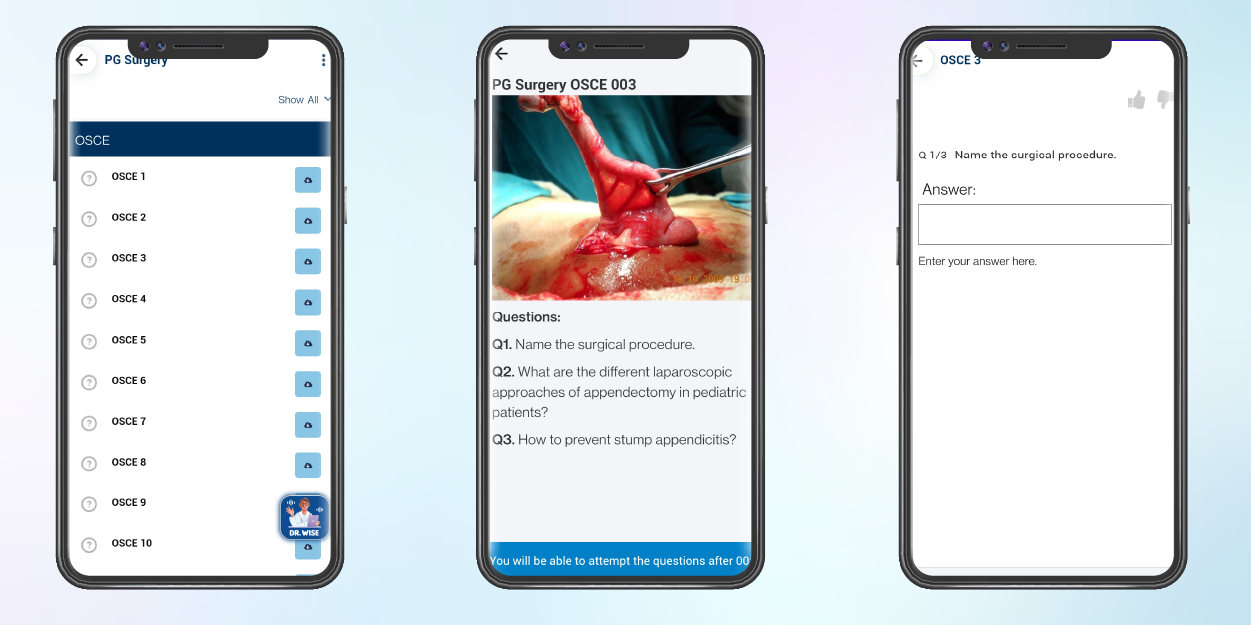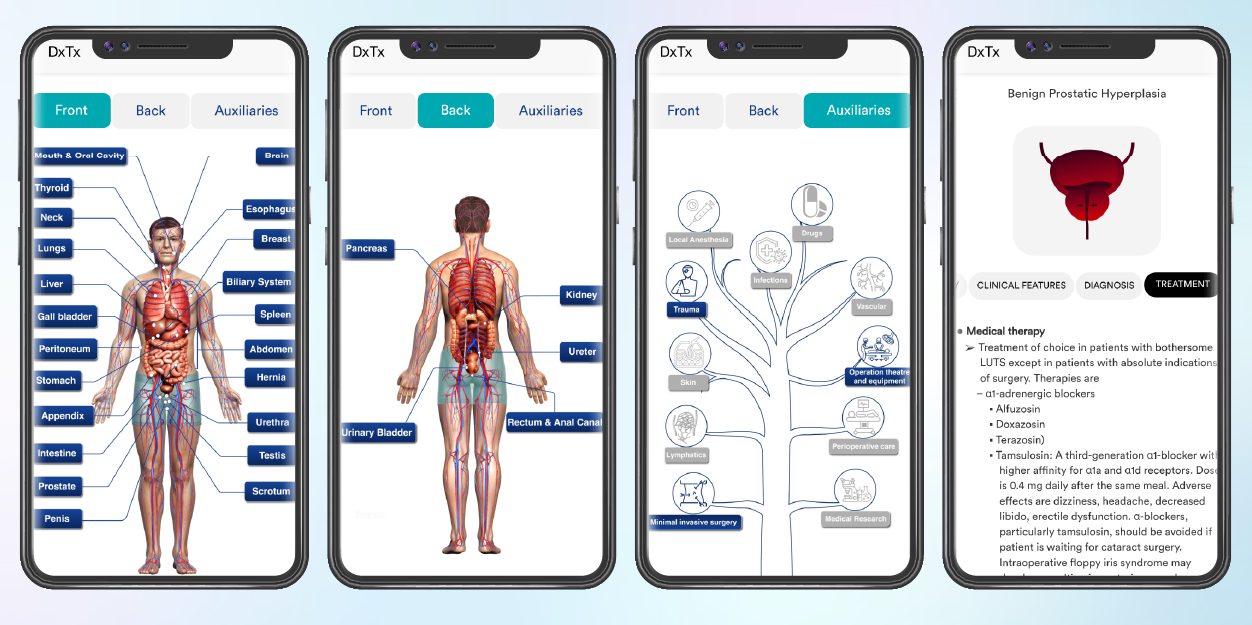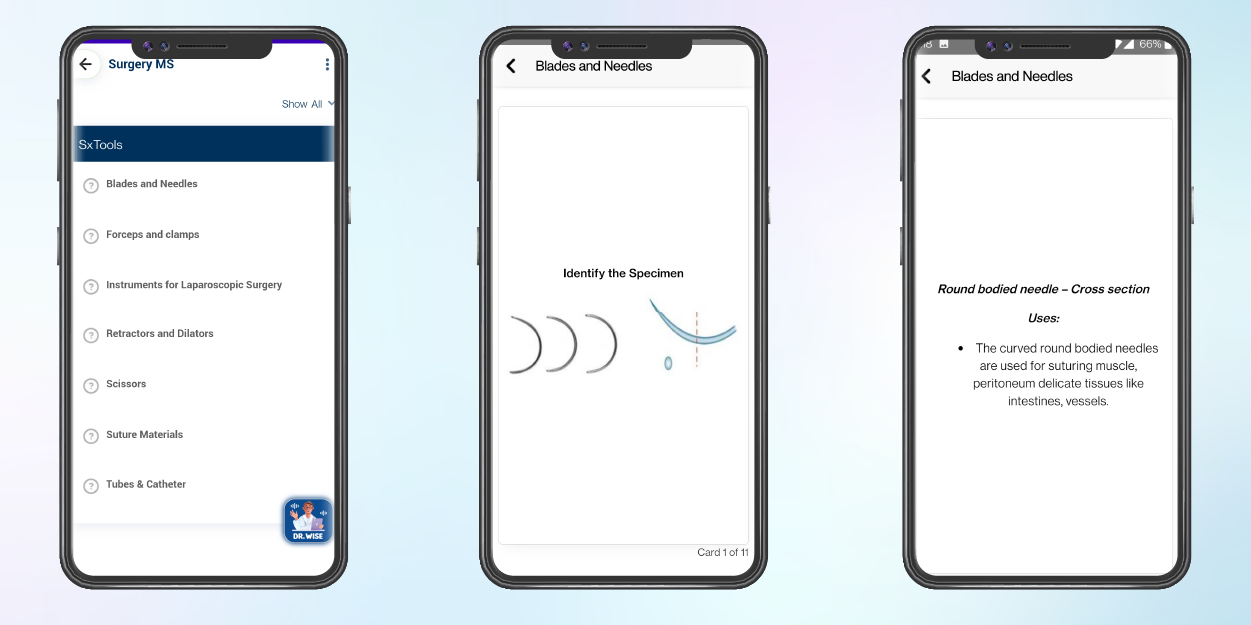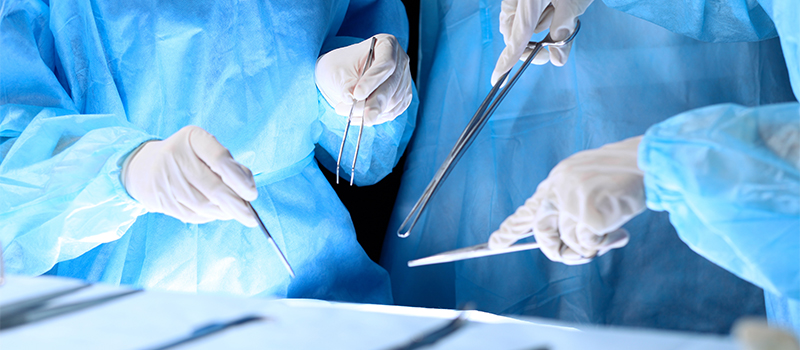DigiNerve’s e-learning course, Surgery MS, is painstakingly created for postgraduate students aspiring to become excellent surgeons. The course is meticulously crafted under the guidance of the esteemed Chief Editor, Prof. Dr. Nilay Mandal, in collaboration with 26 subject experts and eminent surgeons across India. Working with the faculties, Dr. Mandal has also shared his valuable expertise, steering the route with his superb guidance.
This Surgery MS online course employs a case-based approach to solve the challenges faced by postgraduate students in comprehending clinical settings, especially for the ones with little exposure to actual surgeries. The course enables aspiring surgeons to effectively manage patients and apply theoretical knowledge to real-world surgical settings. In addition to preparing postgraduate students for their Master of Surgery final exams, the course strives to instill in them a strong desire to become excellent surgeons who will stop at nothing to ensure the best possible care for their patients.
Course Inclusions
- Video Lectures
- Lecture Notes
- Surgical Tips
- Benchmark Trials
- Self-Assessment Questions
- OSCEs
- DxTx
- SxTools
- Engagement Activities such as Regular Chat Shows
- Wise AI Chatbot
- Printed Notes
The following is the description of Surgery MS online course inclusion and features:
Highly Illustrative Video Lectures: The surgery video lectures for medical students include long and short-case discussions, surgical techniques, and surgical management decisions. The case-based lectures cover differential diagnosis, management techniques, surgical strategies, surgical procedures, complications, preventive patient care, and more. Each segment has been thoughtfully chosen to correspond with the curriculum for the MS exams.
Short and Long Case Discussions: A compilation of carefully chosen short and long case discussion topics covering a wide range of medical super-specialties, designed to help with thorough MS exam preparation.
Lecture Notes: Well-illustrated notes are provided with the lectures that serve as a ready reckoner for learners.
Evidence-based Research: At the end of each lecture, evidence-based research studies are provided to complement the notes and lectures.
Clinical Methods: MS General Surgery postgraduate students can learn about clinical skills by watching the video lectures, which cover pre- and post-operative assessments.
Surgical Procedures: To help students grasp surgical skills, actual surgical procedures are featured in the surgery video lectures with MCQs and notes.
Self-Assessment Questions: Practice questions are incorporated strategically after each video to enhance comprehension in addition to serving as a valuable practice assessment. This helps in self-evaluation helping the learners to understand their strengths and weaknesses.
OSCEs: Objective Structured Clinical Examinations (OSCEs) are an essential tool for evaluating clinical abilities, competencies, and rapid revision. This course feature has an assessment in the flashcard format for self-evaluation, just like the actual exam.

Surgical Tips: This section includes Master of Surgery tips, dos and don’ts of surgical procedures guiding to make informed decisions both before and during surgical procedures. This will help students make the right choices while performing surgery.
DxTx: This special feature is a unique tool for rapid reference, aligned with the NMC curriculum. In this feature, a human model is presented that allows you to explore various diseases and health conditions of body systems with just a click. It includes information about various medical conditions and surgical procedures in a clear and organized manner, including clinical features, diagnosis, pathophysiology, treatment, clinical trial information, and recent advances.

Benchmark Trials: Postgraduates can now stay up to date on the latest developments in the discipline with the addition of evidence-based studies.
SxTools: This is an amazing feature of the course for MS Surgery exam preparation wherein there are flashcards with thorough explanations of surgical instruments.

Engagement Activities: This includes Journal clubs and chat shows where you directly get to learn from the faculty and other eminent surgeons and medical practitioners.
Dr. Wise AI chatbot: It is a comprehensive and interactive solution provider coupled with real published resources including books, journals, notes, and videos to provide appropriate explanations of topics, treatment techniques, and more.
Printed Notes: Brief notes are designed to save your time by providing exam-focused, crisp details with visual learning at an affordable price.
Key Features of Surgery MS Online Course
Surgery MS adopts a case-based approach towards a comprehensive range of medical super specialties, equipping postgraduates with essential clinical skills. The key features are as follows:
- Case-based systemic approach as per NMC curriculum
- Surgical tips comprising dos &don’ts to follow during procedures
- Instrumentation is made easy with flashcards through the SxTools feature
- Critical DxTx information provided through the human model
- OSCEs to prepare and assess one’s skills
- Wise AI chatbot for comprehensive &interactive solutions
Benefits of Enrolling in Surgery MS Course
Pursuing an MS in Surgery can bring a multitude of benefits to your career and personal growth. Online Master of Surgery (MS) courses are becoming increasingly popular because of their flexibility and accessibility. They offer a unique opportunity for medical professionals to gain advanced surgical knowledge and skills without interrupting their careers or relocating. While traditional on-campus programs remain valuable, online MS in Surgery courses present several distinct benefits:
- Flexibility and Convenience.
- Reduced geographical limitations.
- Opportunity to learn from world-class surgeons.
- Master surgical techniques through visual learning.
- Potential Cost and Time Saving.
- Tailored curriculum as per NMC.
- Keeps you abreast of the most recent developments.
- Deepen your understanding of the subject.
- Refine your critical thinking and decision-making skills.
- Greater income potential.
- Enhances professional recognition and reputation.
- Enhances your interpersonal and communication skills.
- Greater sense of accomplishment and satisfaction.
- Enhances networking opportunities.
- Robust research base.
Surgery MS Table of Content
Surgical Skills
Abdominal Wall and Retroperitoneum
- Management of Open Abdomen
- Abdominal Compartment Syndrome and Its Management
- Abdominal compartment syndrome
- Abdominal Compartment Syndrome and its Management
- Abdominal compartment syndrome and Its Management
- Urethral Dilatation
Intestinal Stoma and its Management
Urology
- Uroflowmetry
- Urethral Catheterization
- Understanding Suprapubic Catheterization
- Urethral Injury
- Suprapubic Catheterization
- Urethral Injury
- Urethral Dilation
- Urethral Injury
Skin and Subcutaneous Tissue
- Principles of Suturing Technique
- Instruments and Suture Handling
- Suturing Techniques Models, Foams and Bars
- Skin Incision, Scalpel, and Blades
Vascular Disorders
- Acute Deep Vein Thrombosis and Pulmonary Embolism
- Venesection
- Interpretation of TEG and ROTEM
- Thromboelastography and Rotational Thromboelastometry
Principles of Anesthesia and Pain Management
- Regional Anesthesia Digital Block
- Regional Anesthesia Hernia Block
- Regional Anesthesia Penile Block
Basics of Plastic and Reconstructive Surgery
- Basic Principles of Plastic and Reconstructive Surgery
- Basics of Plastic and Reconstructive Surgery
Trauma
- Interpretation of Trauma Chest X-ray the Advance Trauma Life Support Protocol
- FAST and eFAST
- Needle Decompression, Finger Thoracostomy, and ICD Placement: Chest Decompression
- Helmet removal in a Trauma patient
- Management of Unstable pelvic fracture and Application of Pelvic Binder
- Application of Cervical Collar and Ruling out C-Spine Injury
- Understanding Triage
- General Approach to a Patient with Thoracic Trauma
- Trauma CT Scan
- Venous Access in a Hemodynamically Unstable Trauma Patient and Intravascular Device Placement
- FAST and eFAST
- Helmet Removal in a Trauma Patient
- Management of Unstable Pelvic Fracture and Application of Pelvic Binder
- Application of Cervical Collar and Ruling out C-Spine Injury
- Trauma-Induced Coagulopathy and Interpretation of TEG /ROTEM
- General Approach to Abdomen Trauma
- Trauma CT Scan
- Management of Retroperitoneal Trauma
- Trauma CT Scan
- Helmet Removal in a Trauma Patient
- Damage Control Surgery
- Trauma-Induced Coagulopathy and Importance of Viscoelastic Assays
- Vascular Access in Trauma
- Application of cervical collar and ruling out C-Spine Injury
- Interpretation of Trauma Chest X-ray: The Advance Trauma Life Support Protocol
- Retroperitoneal Trauma
- Principles of Damage Control Surgery
- General Approach to Abdominal Trauma
Wound Healing
- Negative Pressure Wound Therapy
Basic Surgical Skills
- Study of Tracheostomy
- Basic Life Support
- Central Venous Pressure Monitoring Technique
- Endotracheal Intubation
- GI Staplers
- Nasogastric Tube
- Suture Material
- Basics of Blood Transfusion
- Head and Neck Cancer- Punch Biopsy
- Understanding Transfusion Reactions
- Drains in surgery
- GI staplers
- Basics of Blood Transfusion
- Incision and Drainage
- Skin Incision, Scalpel, and Blades
- Use of Different Types of Drains
- Intralesional Injection of Keloid
- Use of Different Types of Scissors Cutting and Dissection
- Drains in Surgery
- Central Venous Pressure Monitoring
- Transfusion Reactions
- Tracheostomy
- Incision and Drainage
- Principles of Seldinger Technique
- Tracheostomy
- Drains in Surgery
- Endotracheal Intubation
- Needle Holder
- Different types of Retractors
- Understanding Transfusion reactions
- Vascular Anastomosis
- Punch Biopsy
- Use of Scissors for Cutting, Dissection
Common Surgical Procedures
- Splenectomy
- Excision of a Scalp Swelling
- Neck Dissection
- Excision of a Scalp Swelling
- Common Surgical Procedures
- Understanding Harmonic Device
- Basic things about harmonic Device and Vessel Sealer (Harmonic Scalpel)
OT Design Technologies
- Patient Positioning in Operation Theatre Table
- Patient Positioning in Operation Theatre Table
Testis, Scrotum and Penis
- Understanding Fournier’s Gangrene
- Evaluation and management of Paraphimosis
- Evaluation and Management of Varicocele Part II
- Penile Fracture
- High inguinal orchidectomy
- Methodology of Prostate Biopsy
- Varicocele Part I
- Mechanism and Management of Zipper Injury
- TRUS Guided Prostate Biopsy
- Management of Zipper Injury
- Evaluation and Management of Fournier’s Gangrene
- Penile Fracture
- Hypospadias
- Phimosis and Circumcision
- Evaluation and Management of Paraphimosis
- Principle of Partial, Total, and Radial Penectomy
- Evaluation and Management of Acute Scrotum
- Orchidopexy
- Phimosis
- Evaluation and Management of Paraphimosis
- Principle of partial/total penectomy
- Management of testicular trauma
- Hydrocele
- Management of Testicular trauma
Clinical Examination
- Examination of Oral Cavity
- Examination of Salivary Neoplasms
- Examination of Hernia
- Examination of Scrotum and Male External Genitalia
- Clinical Examination of Swelling
- Clinical Examination of Ulcer
- Clinical Examination in Arterial Disease
- Clinical Examination in Vascular Disease
- Examination of Varicose Veins
- Examination of Lymph Nodes
- Clinical Examination
Short Cases
- Cleft Lip and Palate
- Neck Swelling
- Breast
- Spleen
- Urology
- Testis, Scrotum and Penis
- Diabetic Foot
- Skin and Subcutaneous Tissue
- Vascular Disorders
- Basics of Plastic and Reconstructive Surgery
- Wound Healing
- Soft Tissue Sarcoma
- Principles of Oncology
- Hernia
Long Cases
- Thyroid
- Breast
- Stomach and Duodenum
- Small Intestine
- Hernia
- Vascular Disorders
Management Decisions
- Liver
- Spleen
- Testis, Scrotum, and Penis
- Hernia
- Skin and Subcutaneous Tissue
- Trauma
- Principles of Anaesthesia and Pain Management
- Cleft Lip and Palate
- Abdominal Wall and Retroperitoneum
- Urology
- Vascular Disorders
- Principles of Oncology
Radiology for Surgical Residents
Surgical Tips
OSCEs
DxTx
Link to the TOC: https://www.diginerve.com/course/surgery-ms/

